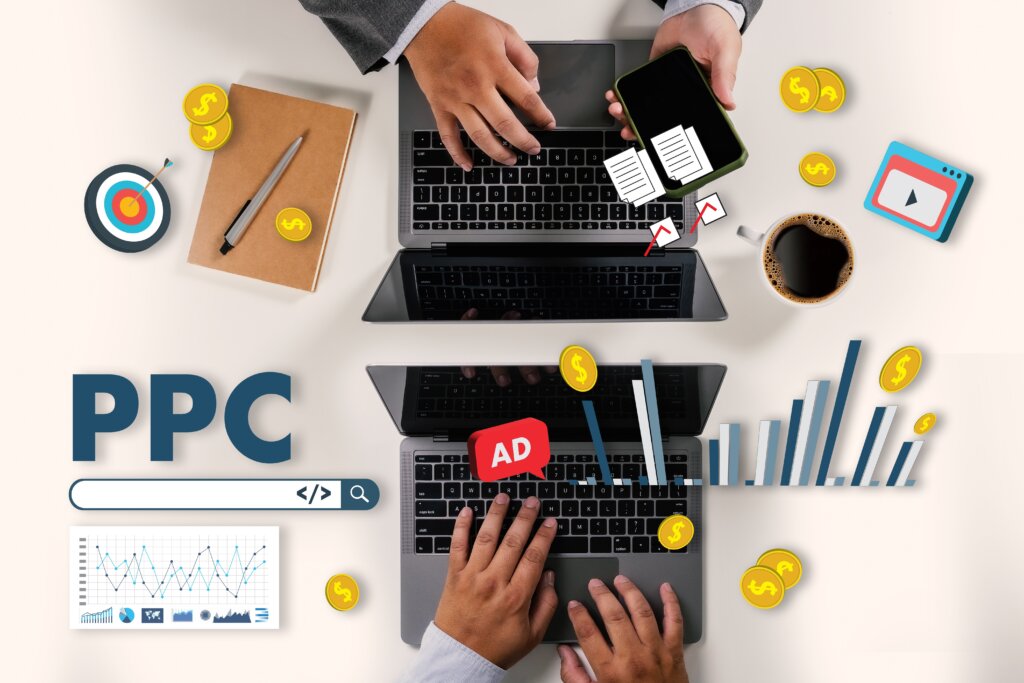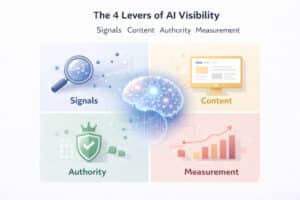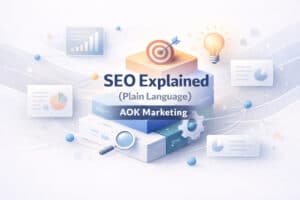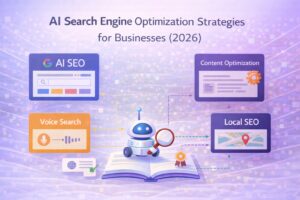Ultimate Guide to PPC: Maximizing Your Digital Marketing in 2024
In this Ultimate Guide to PPC Company selection, we delve into the crucial role of PPC (Pay-Per-Click) advertising within today’s digital marketing landscape and highlight why selecting the right PPC agency is essential for driving business growth.
We’ll offer a detailed explanation of PPC, its importance, and back it up with relevant statistics demonstrating the effectiveness and potential for high ROI. We examine the evolution of PPC agencies in 2024, discussing recent trends, how they’ve adapted to digital changes, and what emerging technologies they’ve embraced.
Key features that elevate a stellar PPC agency, such as industry experience, advanced analytics, and strategic keyword selection, will be thoroughly covered, along with insights into comprehensive multi-channel PPC services.
Our guide also includes diverse case studies to illustrate the tangible benefits a well-executed PPC strategy can have on ROI and business expansion across different industries. We provide a step-by-step approach to help businesses choose an agency that fits their unique goals and budget, emphasizing the significance of vetting an agency’s track record and client feedback.
Furthermore, we explore how PPC can integrate seamlessly with overall digital marketing plans, reinforcing its relationship with SEO, content marketing, and social media.
Looking forward, we investigate emerging PPC trends and make predictions on the industry’s direction, giving businesses foresight into future strategies. Lastly, we answer FAQs about PPC agencies and their contribution to a company’s digital success, concluding with a reminder for businesses to approach PPC agency selection with strategy and care.
Introduction
In a digital ecosystem where visibility translates to viability, Pay-Per-Click (PPC) advertising emerges as a critical strategy for businesses aiming to thrive online. As we navigate through 2024, the importance of a well-executed PPC campaign cannot be overstated, with immediate impacts manifesting in increased traffic, lead generation, and sales conversions. Yet, the success of such campaigns hinges on the expertise of the PPC agency behind them, prompting companies to be meticulous in their selection to ensure alignment with their growth goals.
This “Ultimate Guide to PPC Companies: Maximizing Your Digital Marketing in 2024” serves as your comprehensive roadmap to understanding PPC advertising’s fundamental benefits, spotting a competent agency, and integrating PPC seamlessly into your overall digital strategy. Get ready to explore the pivotal role of PPC in your business’s success and how the right PPC partnership can elevate your digital marketing to new heights.
What is PPC and Why It Matters
Pay-Per-Click (PPC) advertising is a dynamic online marketing model where businesses pay a fee each time their ad is clicked. It’s the digital equivalent of buying visitors to your site, as opposed to earning those visits organically, such as through search engine optimization (SEO). The most common PPC platforms include Google Ads and Bing Ads, with a variety of ad formats ranging from search ads that appear on search engine results pages (SERPs) to display ads found across a network of websites.
PPC matters immensely in the online marketing mix for its unique capacity to deliver targeted traffic to a website at a rapid pace. Unlike organic methods, which can take time to yield results, PPC can generate leads and sales almost immediately once the campaign begins. Additionally, PPC campaigns are highly adjustable and measurable, giving marketers unprecedented control over their advertising spend, audience targeting, and performance tracking.
The significance of PPC in the modern digital advertising realm is backed by compelling statistics:
– According to Google, businesses make an average of $2 in revenue for every $1 they spend on Google Ads.
– Research shows that PPC visitors are 50% more likely to purchase something than organic visitors.
– Ads that appear in the first position on Google search have an average click-through rate of more than 7%.
The numbers clearly indicate that PPC campaigns can deliver impressive ROI when managed effectively. Moreover, PPC data provides invaluable insights into consumer behavior, helping businesses refine their marketing strategies and better understand the effectiveness of their keywords and ad copy. With the ability to test different variables, advertisers are empowered to optimize their campaigns continuously, ensuring maximum impact and ROI potential.
In a world where businesses are vying for online attention, PPC advertising stands out for its direct approach to reaching consumers. When done correctly, PPC not merely garners clicks—but also drives meaningful engagement that can translate into sustained business growth. Whether you’re a small local shop or a multinational corporation, PPC holds the potential to significantly boost your online visibility and bottom-line results.
The Evolution of PPC Agencies in 2024
The landscape of PPC marketing never stands still—it’s an ever-evolving frontier where staying ahead means adapting to change with agility and foresight. As 2024 unfolds, PPC agencies are witnessing significant shifts in trends, consumer behaviors, and technological advancements. Let’s explore the transformative elements shaping the PPC industry this year.
Embracing Automation and AI
Artificial intelligence (AI) and machine learning have become the pilot and co-pilot for modern PPC campaigns, steering them toward greater efficiency and effectiveness. Agencies have embraced these technologies to automate bidding strategies, optimize ad placements, and personalize ad content for specific audience segments. The result is smarter campaigns that learn and evolve, offering a higher level of predictive analysis and performance modeling than ever before.
Data Privacy and Compliance
With internet users increasingly conscious of their digital footprints, data privacy regulations have tightened globally. Agencies have pivoted to strategies that balance potent targeting techniques with respect for user privacy. This includes the utilization of first-party data and finding innovative ways to engage audiences through transparent and consent-based marketing methods.
Voice Search and PPC
Voice search usage has skyrocketed, and PPC agencies have adapted by optimizing for conversational queries and long-tail keywords. They’ve restructured campaigns to anticipate the intent behind voice searches, which often differ from text queries, providing opportunities for more precise targeting and improved ad relevance.
Visual Search Takes Center Stage
Visual search technology enables users to search and shop using images, and PPC agencies have seized this opportunity. By optimizing image-based ads and integrating with platforms that support visual search capabilities, agencies are creating a seamless discovery-to-purchase journey for users inspired by the visual web.
Cross-channel Synergy
In 2024, agencies continue to break down silos between different advertising platforms. Cross-channel PPC strategies have become increasingly important to reach audiences at multiple touchpoints. Agencies now manage and synchronize campaigns across search engines, social media, and other digital channels, crafting a cohesive experience that guides the customer journey from awareness to conversion.
Greater Focus on SERP Position and Features
The layout of the Search Engine Results Pages (SERP) regularly evolves, and in 2024, PPC agencies have had to adjust to these changes. They now place a premium on not just appearing in ads but also on leveraging new SERP features like local service ads, shopping features, and other rich snippets that can boost visibility and credibility.
Creative Disruption and Storytelling
Agencies are pushing the envelope with more creative and engaging ad formats. Interactive ads, augmented reality experiences, and storytelling-based content are becoming part of the PPC playbook. This shift addresses the growing user demand for immersive and narrative-driven interactions with brands.
As we navigate through 2024, PPC agencies are continuously adapting to these developments, always seeking to harness innovative ways to connect with audiences and deliver results for clients. The most successful agencies will be those that not only adopt these trends but also anticipate the future, remaining adaptable in a climate of constant digital transformation.
Key Features to Look for in a PPC Agency
When it comes to investing in a PPC (Pay-Per-Click) agency, discerning the extraordinary from the average is crucial to your campaign’s success. A remarkable agency is marked not just by the results it delivers but by a suite of intrinsic qualities and services. Here are some of the most essential features to look for when choosing a PPC agency:
Industry Experience
An agency’s track record in your specific industry cannot be overlooked. A PPC agency with extensive experience in your sector brings a wealth of insights into consumer behavior, competitive landscape, and market nuances. This expertise ensures that your campaigns resonate with your target audience and stay ahead of industry trends.
Advanced Analytics
Data is the driving force behind effective PPC campaigns. Opt for an agency that boasts advanced analytics capabilities, demonstrating not only skill in data collection but also proficiency in interpreting that data to make informed decisions. Their analytical prowess should encompass user behavior, conversion tracking, and overall campaign performance to continually refine your marketing strategies.
Strategic Keyword Selection
Keywords are the linchpin of PPC advertising; thus, the ability to select and optimize the right keywords is paramount. An exceptional PPC agency employs a strategic approach to keyword research, understanding both high-volume terms and long-tail phrases that could drive qualified traffic. Such meticulousness in keyword selection positions your campaigns to capture the most relevant and conversion-ready audience.
Comprehensive Multi-Channel PPC Services
Modern online marketing transcends the boundaries of a single platform. A top-tier PPC agency offers comprehensive multi-channel PPC services that coordinate campaigns across various platforms, from search engines to social media. This assures a unified brand presence and maximizes exposure across all customer touchpoints.
When hunting for the perfect PPC agency, these key features should form the core of your criteria. An agency that demonstrates industry experience, wields advanced analytics, strategically selects keywords, and offers multi-channel services is equipped to amplify the potential of your PPC campaigns. This kind of agency doesn’t just aim for clicks; it aims for meaningful engagement that drives your business forward.
Case Studies and Success Stories
When it comes to PPC (Pay-Per-Click) advertising, the proof is always in the performance. Across industries and scales, businesses that harness the power of sophisticated PPC strategies have witnessed transformative results. Here we shine a spotlight on a selection of case studies that exemplify the tremendous impact of well-implemented PPC efforts on business growth and ROI.
E-commerce Revolution: GS1 US’s Journey from $127 CPA to $16.32
In the fiercely competitive e-commerce landscape, streamlining cost-per-acquisition (CPA) is pivotal for profitability. GS1 US, a leading supplier of barcodes and unique identification solutions, faced the challenge of diminishing ROI despite considerable ad spend. By adopting the latest PPC tools, including smart bidding and dynamic search ads, GS1 US revamped their PPC strategy.
The sophisticated use of these tools allowed for real-time bidding adjustments and better targeting of high-converting search terms. As a result, they slashed their CPA down to an impressive $16.32 from a staggering $127. This phenomenal decrease not only boosted immediate sales but also enhanced their overall marketing efficiency, proving the pivotal role of innovative PPC tools in scaling e-commerce growth.
Merriam-Webster Dictionary: Achieving One Cent Clicks
For Merriam-Webster, an esteemed publishing company, revenue hinged upon page views. Their target? To achieve cost-effective clicks that would bring a massive influx of traffic to their online dictionary, thereby maximizing ad revenue generated from pageviews. Through a meticulously crafted PPC campaign that utilized long-tail keywords and focused on user intent, they managed to achieve clicks for as little as one cent.
The campaign was not just a triumph in reducing click costs but also in understanding and leveraging user behavior. This strategic approach demonstrated how granular control over PPC can result in substantial gains for businesses whose revenue models are heavily reliant on page traffic.
Home Painters Toronto: Maintaining Lead Flow in Winter
Service-based businesses like Home Painters Toronto typically experience seasonality shifts, with winter often leading to a lull in demand. To combat this, they employed a PPC strategy aimed at maintaining a consistent lead pipeline throughout these slower months. By adjusting their ad messaging to highlight indoor painting services and leveraging remarketing techniques, they succeeded in capturing the attention of potential customers who were considering home improvements during the winter.
The result was a steady stream of leads, proving that with the right PPC approach, businesses can overcome seasonal challenges and maintain customer engagement year-round. The ability to pivot based on seasonality and user intent is crucial for service-oriented businesses to drive growth, regardless of the time of year.
These case studies underscore the diverse applications and extraordinary outcomes that tailor-made PPC strategies can produce. From reducing CPAs by over 87% to driving one cent clicks that propel ad revenue, and ensuring lead generation during off-peak seasons, PPC advertising emerges as a linchpin for sustainable business growth and profitability. The success stories shared elucidate the transformative power of a well-thought-out PPC campaign, affirming that when executed with skill and precision, PPC is an unparalleled tool for digital marketing triumph.
Choosing the Right PPC Agency for Your Business
In your quest to harness the power of Pay-Per-Click (PPC) advertising, selecting an agency that is well-aligned with your business’s specific needs and objectives is of paramount importance. Here’s an objective guide to navigating this process effectively.
1. Define Your Goals and Budget
Start with introspection—determine what you want your PPC campaign to achieve. Are you looking to boost online sales, drive in-store visits, or improve lead generation? Equally critical is establishing your budget. Knowing the financial resources you can allocate to PPC will help you communicate your constraints and expectations to the agency.
2. Analyze Agency Track Records
An agency’s history can reveal its efficiency and effectiveness in managing PPC campaigns. Look for evidence of their success such as case studies, industry awards, or recognitions in your business domain. For example, a company like AOKMarketing.com demonstrates its expertise through detailed case studies that outline their strategic approach to PPC.
3. Evaluate Client Testimonials
Client feedback is invaluable when it comes to understanding an agency’s ability to deliver. Honest testimonials shed light on not just the outcomes but also the working relationship that you can expect. A successful agency should have numerous testimonials that attest to both their performance and client satisfaction.
4. Inspect the Range of PPC Services Offered
PPC isn’t a monolith; it’s an amalgam of different strategies and tools. A good PPC agency should offer a wide range of services that cover various aspects of PPC advertising, including search ads, display ads, remarketing, and beyond. This ensures that they can handle the dynamic needs of your campaigns and adjust strategies as the market changes.
5. Consultation and Strategy Discussion
Most reputable agencies offer an initial consultation to discuss potential strategies tailored to your business’s unique needs. Use this opportunity to get a feel for the agency’s approach, their understanding of your industry, and how they communicate and collaborate with clients.
6. Assess Their Growth Contributions
Finally, an agency should be evaluated on its overt commitment to driving your growth. Look for indicators that the agency is dedicated to optimizing your ROI and has a clear strategy for doing so, which involves regular reporting, transparent communication, and an adaptable approach to ad strategy.
Embarking on a PPC journey with an agency that demonstrates a robust and results-driven approach, such as the case with AOKMarketing.com, suggests a partnership built on accountability and performance. In the end, make your selection not solely based on an agency’s promises but on their proven ability to execute effective PPC strategies that drive real business outcomes.
Integrating PPC with Your Overall Digital Marketing Strategy
When PPC campaigns are mentioned, advertisements generating instant visibility and quick clicks come to mind, but there’s much more to PPC when it’s integrated into your broader digital marketing strategy. A holistic approach can amplify your marketing efforts, create cohesion, and drive more significant results. Let’s look at how PPC can work in concert with other key elements of digital marketing.
PPC and SEO: Complementary Powers
Search Engine Optimization (SEO) and PPC are often seen as opposites; however, these two strategies can complement one another beautifully. SEO focuses on organic traffic growth, improving your site’s visibility through content optimization and backlink building, but results can take time. PPC, on the other hand, provides immediate visibility and can cover gaps in organic search coverage.
Together, they cover both the slow-and-steady and the quick-win approaches. Integrating PPC with SEO helps you dominate search engine results pages (SERPs) — PPC ads often appear at the top of the page, while strong SEO can rank your organic content right below. This double presence increases credibility and the chance of capturing clicks. Additionally, the keyword data and user insights from PPC can inform and refine your SEO efforts, identifying high-converting keywords that can improve your organic content strategy.
Bridging PPC and Content Marketing
Content marketing attracts visitors through valuable, relevant content, but it’s PPC that can boost the reach of that content to targeted audiences. By using PPC to drive traffic to high-quality content, you increase the chance of engagement and conversion. Furthermore, content reinforced by PPC ads can lead to better quality scores in ad platforms, decreasing your cost per click and stretching your advertising budget further.
Moreover, the performance data from PPC campaigns can give insights into which types of content resonate most with your audience. This allows for the optimization of future content, so you continue delivering exactly what your audience wants to see.
Synchronizing PPC and Social Media Marketing
Social media marketing is an arena where brand personality and customer interaction converge, making it a perfect platform to extend the reach of PPC campaigns. Social media platforms possess extensive user data, enabling businesses to target ads very precisely. By implementing PPC on social media, your business can maximize visibility among the exact demographics you’re trying to reach.
Synchronizing PPC with social media posts and strategies can increase engagement and sharing potential. Ads on social platforms can also lead to immediate actions — like special offers, event sign-ups, or product purchases — benefiting from the social context and driving conversions.
Amplified Benefits of a Unified Digital Marketing Approach
When PPC is thoughtfully integrated with SEO, content marketing, and social media marketing, the result is a comprehensive digital strategy where the sum is greater than its parts. This unity:
1. Provides a consistent message across multiple channels, solidifying brand identity and trust.
2. Maximizes data collection, allowing for more precise targeting and personalization across efforts.
3. Diversifies traffic sources, minimizing risk and ensuring stability if one channel underperforms.
4. Enhances customer journeys, giving multiple touchpoints for engagement and conversion.
Leveraging PPC in tandem with your overall digital marketing strategy is the best way to ensure each component is not only functioning effectively on its own but also contributing to the success of the whole. This integration catalyzes a cycle of improvement and refinement across all channels, leading to an increased ROI and a formidable digital presence well into 2024 and beyond.
The Future of PPC: Emerging Trends and Predictions
As we look toward the horizon of digital advertising, PPC stands at the cusp of transformative changes defined by technological advancements and evolving user behaviors. In this decisive era, businesses must anticipate and adapt to emerging trends to ensure their PPC campaigns remain effective and competitive.
Increased Use of AI and Machine Learning: One of the most significant shifts in the PPC domain is the integration of Artificial Intelligence (AI) and machine learning. These technologies are revolutionizing the way campaigns are managed by automating complex bidding strategies and enhancing ad targeting precision. AI enables real-time adjustments based on data analysis, improving campaign performance and ROI.
Voice and Visual Search Optimization: Consumer tendencies are evolving to embrace voice-activated queries and visual searches. Optimizing for voice search requires a focus on long-tail keywords and conversational phrases that mirror natural speech patterns. On the other hand, visual search optimization calls for businesses to ensure their image content is clear and appropriately tagged for platforms like Google Lens. Being visible in these expanding search frameworks will be essential for future PPC success.
Audience Targeting and Personalization: Moving away from solely keyword-centered campaigns, successful PPC now mandates a profound understanding of the audience demographics, interests, and behavior. Ad personalization extends to creating dynamic search ads that morph to fit individual user traits—be it location, device usage, or even time of day—offering a more relevant and engaging user experience.
Social Media Integration: Emerging social platforms bring new opportunities for PPC campaigns. TikTok, with its vast and engaged audience, and LinkedIn, a haven for B2B marketing, are becoming essential for a diverse ad strategy. Integrating PPC into these networks requires understanding unique platform dynamics and user intentions.
Mobile-Friendly Campaigns: As mobile browsing prevails, PPC ads must be responsive and optimized for smaller screens. This includes designing ads with speed, navigation, and clear call-to-action elements that cater to the mobile user’s experience.
Smart Bidding Strategies: The increasing sophistication of smart bidding, which leverages machine learning to maximize conversion potential, is making precise budget allocation easier and more efficient. Advertisers can rely on system-generated insights to bid smarter, not harder.
Remarketing and Audience Retention: Remarketing remains a robust strategy, targeting users who have previously interacted with a brand to bring them back into the conversion funnel. Coupled with strategies centered around user retention, remarketing underscores the value of a continued engagement in driving PPC success.
Adapting to Platform-Specific Changes: PPC professionals must keep a close eye on the evolving features of ad platforms. Whether it’s embracing the new functionalities of Microsoft Advertising or adapting to Google Analytics 4 (GA4), staying updated and compliant with these tools is critical.
Diversification Across Platforms: It’s becoming increasingly beneficial to explore advertising on platforms beyond the traditional giants. Amazon, for instance, offers powerful options for product-based PPC campaigns, and there’s growing speculation around the advertising potential within entertainment platforms, such as Netflix.
To capitalize on these developments, businesses should invest in continuous learning to stay ahead in PPC knowledge, remain flexible with their strategies, and emphasize the importance of finely tuned targeting and personalization. Embracing innovation and adapting to the evolving digital landscape will be key in harnessing the robust potential that PPC offers for future success.
FAQs About PPC and PPC Agencies
Here are some common questions and concerns about PPC advertising and the role of PPC agencies in a business’s digital marketing strategy:
- What is PPC Advertising? PPC advertising is a model of online marketing where advertisers pay a fee each time one of their ads is clicked. It’s a way of buying visits to your site, rather than attempting to “earn” those visits organically.
- How Does PPC Advertising Work? In PPC advertising, ads are typically placed on search engine results pages or websites. The ad auction system selects the ads to be displayed based on each ad’s bid, quality, and potential impact.
- What Factors Determine PPC Costs? PPC costs can be influenced by factors like company size, industry, the complexity of the PPC strategy, and the PPC ad network used. Average costs can vary significantly based on these factors.
- What Are the Different PPC Pricing Models? Common PPC pricing models include a percentage of ad spend, fixed monthly costs, performance-based pricing, project-based pricing, and hourly rates. Each model has its pros and cons, and the choice depends on the specific needs and budget constraints of a business.
- What Should I Ask a PPC Agency Before Hiring Them? Key questions to ask a PPC agency include their experience in improving PPC performance, specific use cases, particularly in your sector, and details about who will be managing your PPC campaign.
- Why Consider Outsourcing PPC Management? Outsourcing PPC management can lead to better results through expert optimization of campaigns and the use of advanced features like automated bidding and remarketing. However, it can be expensive, and selecting the right agency is crucial.
- What Are the Pros and Cons of PPC Outsourcing? The pros include access to expertise and potentially better results. The cons include the expense and the risk of choosing an ineffective agency.
- How Often Should PPC Campaigns Be Checked? PPC campaigns should ideally be monitored weekly, and brand-new campaigns might need daily monitoring to optimize performance effectively.
- What Is the Role of Social Media in PPC? Social media platforms are increasingly used for PPC advertising due to their large, active user bases. They allow for highly targeted advertising based on user behavior and preferences.
- What Types of PPC Ads Are There? PPC ads can range from search ads that appear on search engine results pages, display ads on websites, social media ads on platforms like Facebook and Twitter, retargeting PPC ads that target previous website visitors, and local PPC ads that target specific geographic areas.
- How Important is Mobile Optimization for PPC? Mobile optimization is crucial for PPC as a significant portion of internet users access the web through mobile devices. Ads should be designed to perform well on smaller screens and in mobile-specific search environments.
- What Role Does Keyword Research Play in PPC? Keyword research is fundamental to PPC. It involves identifying the terms and phrases your target audience uses when searching online. This helps in crafting ads that are more likely to be clicked on, leading to higher conversion rates.
- How Can PPC Impact SEO? While PPC does not directly affect SEO rankings, it can complement your SEO efforts. Insights from PPC campaigns, like keywords that drive traffic, can inform your SEO strategy.
- Is PPC Effective for All Types of Businesses? PPC can be effective for a wide range of businesses, from small local shops to large corporations. However, the approach and strategy might differ based on business size, industry, and target audience.
- What Metrics Are Important to Track in PPC Campaigns? Key metrics to track include Click-Through Rate (CTR), Conversion Rate, Quality Score, Cost Per Click (CPC), and Return on Ad Spend (ROAS).
- How Do PPC Agencies Measure Success? PPC agencies typically measure success through metrics like lead generation, conversions, and the ROI of the ad spend. They also look at the overall growth in traffic and brand visibility.
- Can I Do PPC Myself or Do I Need an Agency? While it’s possible to manage PPC campaigns yourself, especially with small campaigns, an agency can bring expertise, resources, and time savings, especially for larger or more complex campaigns.
- What Are the Latest Trends in PPC? Current trends in PPC include the increasing use of AI and machine learning for campaign optimization, voice search optimization, and the growing importance of video ads, especially on platforms like YouTube and TikTok.
- How Long Does It Take to See Results from a PPC Campaign? The time it takes to see results from a PPC campaign can vary. Some campaigns can yield immediate results, especially in terms of traffic increase, while others, particularly those focused on conversions or highly competitive markets, may take longer to show significant outcomes.
- What is the Difference Between PPC and Organic Search Marketing? PPC is a paid form of advertising where you pay for each click on your ad, offering immediate visibility. Organic search marketing (SEO) involves optimizing your website to rank higher in search engine results over time, a process that doesn’t involve direct payment to search engines but requires continuous effort and time.
- How Does Seasonality Affect PPC Campaigns? Seasonality can have a significant impact on PPC campaigns, as consumer behavior and search patterns change during holidays, events, or specific seasons. Advertisers need to adjust their strategies and budgets to capitalize on these changes in demand.
- Can PPC Help in Brand Building? Yes, PPC can be effective for brand building. By increasing visibility in search engines and on relevant websites, PPC ads can enhance brand awareness and recognition, even if they don’t lead to immediate conversions.
- How Do I Choose the Right Keywords for My PPC Campaign? Choosing the right keywords involves understanding your target audience’s search behavior, considering the relevance to your products or services, analyzing competition, and using keyword research tools to find high-traffic and cost-effective keywords.
- What Are the Common Mistakes to Avoid in PPC? Common mistakes in PPC include not optimizing for mobile, ignoring negative keywords, targeting overly broad keywords, neglecting the use of ad extensions, and failing to test and refine ad copy.
- What is the Role of A/B Testing in PPC? A/B testing in PPC involves comparing two versions of an ad to see which performs better. It’s a critical process for optimizing ad copy, landing pages, and overall campaign strategy to improve conversion rates and campaign effectiveness.
Conclusion
Navigating the intricate world of PPC advertising requires a blend of strategic insight, technical expertise, and creative acumen, all underscored by the unwavering goal of maximizing ROI. As we’ve journeyed through the realms of what makes a PPC agency truly outstanding, from understanding PPC’s pivotal role and identifying the remarkable evolution of PPC in 2024, to selecting the right PPC partner and integrating it with a broader digital strategy, one thing remains clear: the power of PPC to transform your business’s digital trajectory is undeniable.
By embracing the symbiosis of PPC with SEO, content marketing, and social media, as well as keeping a pulse on emerging trends and predictions, you can ensure that your campaigns are sharp, effective, and future-forward. Remember, the choice of your PPC company is not a decision to be taken lightly; it is a partnership that can steer your business towards unprecedented growth.
In an age where change is the only constant, arming your business with the right strategies and a PPC agency that understands and anticipates these shifts is critical. With the knowledge you’ve gleaned from this guide and the determination to apply it, your business is set to unlock the full potential of PPC advertising in 2024 and beyond.
We invite you to harness our expertise in PPC and join the ranks of success stories we proudly share. Be it for a consultation, strategy development, or managing your comprehensive PPC demands, reaching out could be the first step in a journey towards achieving your digital marketing goals. Take action today and let’s explore the endless possibilities that a tailored, insightful PPC approach can unlock for your business.
What Are Some Key Components of a Successful PPC Campaign? Key components include a high expected click-through rate (CTR), efficient ad cost management, strategic ad positioning, and maintaining an optimal average cost-per-click (CPC).
About The Author
Dave Burnett
I help people make more money online.
Over the years I’ve had lots of fun working with thousands of brands and helping them distribute millions of promotional products and implement multinational rewards and incentive programs.
Now I’m helping great marketers turn their products and services into sustainable online businesses.
How can I help you?





